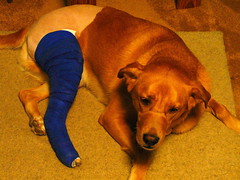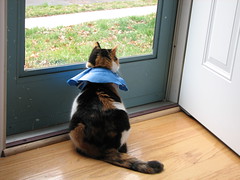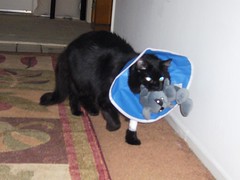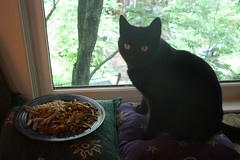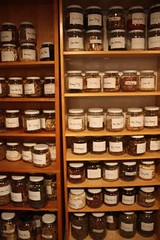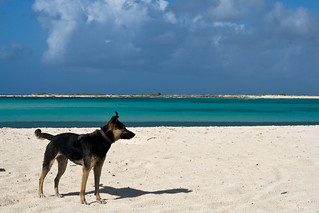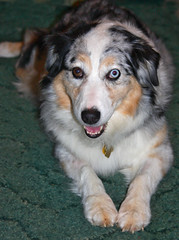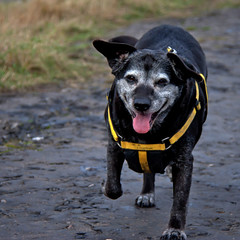What I made today – Xiao Feng San – dispel wind powder for itching
October 1st, 2012 I made this one for my own dog Alli, who is prone to getting itchy especially when she goes to the dog park, eats too many treats, or finds a hot dog bun in the bushes. Most of the time this is fairly under control through her grain free raw diet but occasionally she has a super itchy day. I did get a look from her yesterday when she was eating her food with herbs in it slower than normal, “why you put stinky herbs in my food mom, yuck!?”, so next time I may stick them in gel caps for her.
I made this one for my own dog Alli, who is prone to getting itchy especially when she goes to the dog park, eats too many treats, or finds a hot dog bun in the bushes. Most of the time this is fairly under control through her grain free raw diet but occasionally she has a super itchy day. I did get a look from her yesterday when she was eating her food with herbs in it slower than normal, “why you put stinky herbs in my food mom, yuck!?”, so next time I may stick them in gel caps for her.
Xiao Feng San is one of the first formulas that I learned about from my first herbal teacher, Richard Panzer. At first I had a lot of disappointment with the formula. It can be a great formula for itchy dogs however I thought it would be my cure all. Since then I have found that I wasn’t using it in a high enough dose and that it doesn’t work that well for the very bad chronically itchy dog.
Where it does work well is for the dogs that are itchy but their skin is actually in pretty good shape. However they still bite or scratch at themselves like they are being attacked by invisible bugs. Usually the itchiness is shifting, a little itchy on the ear and then the belly and then the side.
Where I have found it doesn’t work well is for those dogs with bad skin infections or inflammations who have thickened skin, oozing sores, and massive hair loss. For those guys you really need to work closely with an herbalist and also focus on nutrition. See Itchy Dogs the link between inflammation and diet. Most of the dogs I work with who have severe skin disease get started on Si Miao San or Qing Ying Tang and often both together. Occasionally I will use Xiao Feng San in combination with these formulas.
So in Chinese medicine shifting itching is said to come from wind that moves through the skin. It is often worse in the windy seasons of fall and spring, which are also our allergen seasons. This formula helps to dispel wind from the body and also has an effect to tonify blood, so there is good blood flow to the skin and decreased inflammation. It also helps to cool down the skin. Wind doesn’t effect an animal without some imbalances or it wouldn’t be able to get inside. Similar to folks with suppressed immune systems being sick more often, animals with deficiencies are more prone to itchiness. By the way there is a great formula for those who always get sick called Jade Wind Screen (more about that later). Additionally Xiao Feng San also has a mild effect in improving leaky gut and helping digestion.
I do have to say this is one of the most beautiful and diverse formulas. Just look at the colors and textures.
So how does this formula work?
Jing Jie (schizonepeta stem)
Fang Feng (siler root)
Niu Bang Zi (greater burdock fruit)
Chan Tui (cicada molt)
Cang Zhu (atractylodes root)
Ku Shen (sophora root)
Shi Gao (gypsum)
Zhi Mu (anemarrhenae rhizome)
Sheng Di Huang (rehmannia root)
Dang Gui (chinese angelica root)
Hei Zhi Ma (black sesame seeds)
Gan Cao (licorice root)
Mu Tong (akebia)
Let’s start with Jing Jie, I love the smell of schizonepeta stem. It also has a lovely green color. With Fang Feng , Niu Bang zi and Chan tui it helps to open the pores and release wind – aka stop itching. Yes you read that right, this formula contains chan tui, the molted exoskeleton of cicada. If there is one thing is my pharmacy that makes people feel like they have walked into a witch’s apothecary it would be the cicada. My son used to like to impress visiting guests by showing them off and often eating one. He learned early on what was ok to eat in my pharmacy. And these little ghosts of insects really do help with itching.
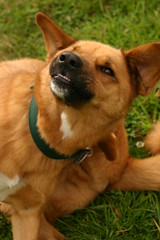 Cang Zhu helps to drain inflammation and support digestion. Ku shen and Mu tong both decrease inflammation and clear heat. Shi gao and Zhi mu take that one step deeper and clear heat at a deeper qi level. In other words they are trying to get rid of the core or root of the heat that causes inflammation and keep it from getting worse.
Cang Zhu helps to drain inflammation and support digestion. Ku shen and Mu tong both decrease inflammation and clear heat. Shi gao and Zhi mu take that one step deeper and clear heat at a deeper qi level. In other words they are trying to get rid of the core or root of the heat that causes inflammation and keep it from getting worse.
Sheng Di Huang and Dang Gui help to tonify the blood, increasing blood production in the bone marrow and keeping a healthy blood volume to nourish the skin so that it stays healthy. Hei Zhi Ma aids in this process also keeping the skin moist. Some anti-inflammatory herbs can be drying and these ingredients help to balance that out.
Finally Gan Cao or licorice comes in and to harmonize the other herbs. Gan Cao also supports the adrenal system and removes toxicity in the body.
This formula should never be used in very old or sick animals unless they are under the care of a veterinary herbalist. Available in my etsy shop Kingdom of Basil.










